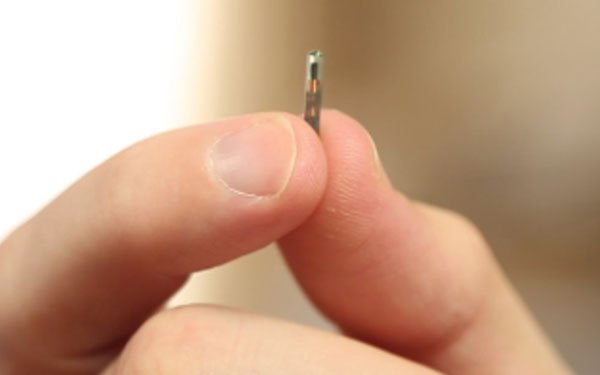
Some employees at a Wisconsin company are going to have
chips implanted into them.
The company, Three Square Market (32M), announced that it is offering implanted chip technology to all of its employees beginning Aug. 1.
Employees who want
them will be implanted with an RFID chip allowing them to make purchases in their break room, log in to computers, open doors and use the copy machine.
The company is expecting more than 50
employees to be voluntarily chipped by BioHax International from Sweden.
This is believed to be the first employee-chipping programming in the U.S.
Companies in Sweden, Belgium and
Australia have been implanting chips into people for some time.
Earlier this year, lawmakers in Nevada introduced a bill that would make it a felony to require someone to be implanted with a
chip, which could be a radio frequency identification (RFID) or near field communication (NFC) chip, as I wrote about here at the time (State Moves To Outlaw Putting Chips In People).
RFID chips use
electromagnetic fields to identify electronically stored information. The chips are about the size of a grain of rice and are implanted between the thumb and forefinger. They use NFC technology like
that used for contactless mobile payments.
Micro markets, also known as the break room market, are essentially mini convenience stores located in the employee break room using self-checkout
kiosks.
Wisconsin-based 32M sells micro market technology and operates more than 2,000 kiosks in 20 countries.
One of the reasons for the chip implantations is that 32M wants to have
first-hand knowledge of the technology, since they market technology for companies’ micro markets.
“If a company wants the ability, we can say we have it,” Tony Danna, vice
president of international sales at 32M, told me.
As in other implementations, no employees will be forced to get the chips implanted.
“We have RFID wrist bands and RFID rings as
well,” said Danna, who said while some employees will opt not to have the chips, no one is adamantly against the idea. “It’s not trackable and anyone can pop it out, like a
splinter.”
The chips, which retail for about $300, have to be within six inches of an NFC terminal to work, Danna said.
Credit card information also can be stored on the chip,
much like it is linked to phone chips for mobile payments.
“Eventually this technology will become standardized, allowing you to use this as your passport, public transit and all
purchasing opportunities,” stated 32M CEO Todd Westby.
To launch the program, employees will be chipped at a ‘chip party’ at 32M’s River Falls headquarters next
week.
“Our CEO and his whole family are going to get them,” said Danna.